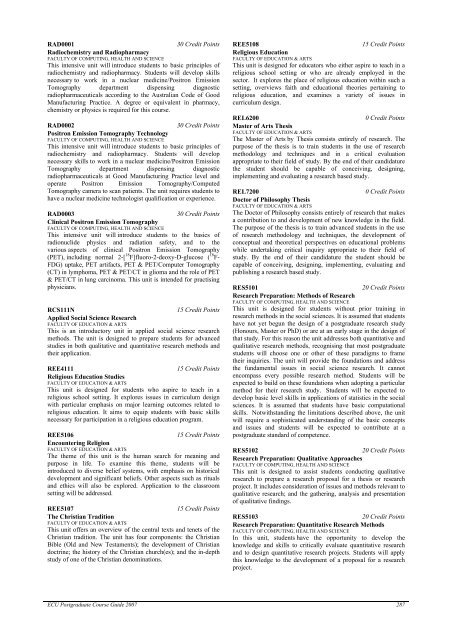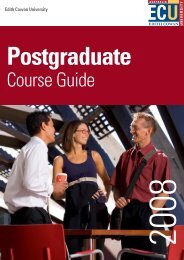Course Guide - Edith Cowan University
Course Guide - Edith Cowan University
Course Guide - Edith Cowan University
Create successful ePaper yourself
Turn your PDF publications into a flip-book with our unique Google optimized e-Paper software.
RAD0001<br />
30 Credit Points<br />
Radiochemistry and Radiopharmacy<br />
FACULTY OF COMPUTING, HEALTH AND SCIENCE<br />
This intensive unit will introduce students to basic principles of<br />
radiochemistry and radiopharmacy. Students will develop skills<br />
necessary to work in a nuclear medicine/Positron Emission<br />
Tomography department dispensing diagnostic<br />
radiopharmaceuticals according to the Australian Code of Good<br />
Manufacturing Practice. A degree or equivalent in pharmacy,<br />
chemistry or physics is required for this course.<br />
RAD0002<br />
30 Credit Points<br />
Positron Emission Tomography Technology<br />
FACULTY OF COMPUTING, HEALTH AND SCIENCE<br />
This intensive unit will introduce students to basic principles of<br />
radiochemistry and radiopharmacy. Students will develop<br />
necessary skills to work in a nuclear medicine/Positron Emission<br />
Tomography department dispensing diagnostic<br />
radiopharmaceuticals at Good Manufacturing Practice level and<br />
operate Positron Emission Tomography/Computed<br />
Tomography camera to scan patients. The unit requires students to<br />
have a nuclear medicine technologist qualification or experience.<br />
RAD0003<br />
30 Credit Points<br />
Clinical Positron Emission Tomography<br />
FACULTY OF COMPUTING, HEALTH AND SCIENCE<br />
This intensive unit will introduce students to the basics of<br />
radionuclide physics and radiation safety, and to the<br />
various aspects of clinical Positron Emission Tomography<br />
(PET), including normal 2-[ 18 F]fluoro-2-deoxy-D-glucose ( 18 F-<br />
FDG) uptake, PET artifacts, PET & PET/Computer Tomography<br />
(CT) in lymphoma, PET & PET/CT in glioma and the role of PET<br />
& PET/CT in lung carcinoma. This unit is intended for practising<br />
physicians.<br />
RCS111N<br />
15 Credit Points<br />
Applied Social Science Research<br />
FACULTY OF EDUCATION & ARTS<br />
This is an introductory unit in applied social science research<br />
methods. The unit is designed to prepare students for advanced<br />
studies in both qualitative and quantitative research methods and<br />
their application.<br />
REE4111<br />
15 Credit Points<br />
Religious Education Studies<br />
FACULTY OF EDUCATION & ARTS<br />
This unit is designed for students who aspire to teach in a<br />
religious school setting. It explores issues in curriculum design<br />
with particular emphasis on major learning outcomes related to<br />
religious education. It aims to equip students with basic skills<br />
necessary for participation in a religious education program.<br />
REE5106<br />
15 Credit Points<br />
Encountering Religion<br />
FACULTY OF EDUCATION & ARTS<br />
The theme of this unit is the human search for meaning and<br />
purpose in life. To examine this theme, students will be<br />
introduced to diverse belief systems, with emphasis on historical<br />
development and significant beliefs. Other aspects such as rituals<br />
and ethics will also be explored. Application to the classroom<br />
setting will be addressed.<br />
REE5107<br />
15 Credit Points<br />
The Christian Tradition<br />
FACULTY OF EDUCATION & ARTS<br />
This unit offers an overview of the central texts and tenets of the<br />
Christian tradition. The unit has four components: the Christian<br />
Bible (Old and New Testaments); the development of Christian<br />
doctrine; the history of the Christian church(es); and the in-depth<br />
study of one of the Christian denominations.<br />
REE5108<br />
15 Credit Points<br />
Religious Education<br />
FACULTY OF EDUCATION & ARTS<br />
This unit is designed for educators who either aspire to teach in a<br />
religious school setting or who are already employed in the<br />
sector. It explores the place of religious education within such a<br />
setting, overviews faith and educational theories pertaining to<br />
religious education, and examines a variety of issues in<br />
curriculum design.<br />
REL6200<br />
0 Credit Points<br />
Master of Arts Thesis<br />
FACULTY OF EDUCATION & ARTS<br />
The Master of Arts by Thesis consists entirely of research. The<br />
purpose of the thesis is to train students in the use of research<br />
methodology and techniques and in a critical evaluation<br />
appropriate to their field of study. By the end of their candidature<br />
the student should be capable of conceiving, designing,<br />
implementing and evaluating a research based study.<br />
REL7200<br />
0 Credit Points<br />
Doctor of Philosophy Thesis<br />
FACULTY OF EDUCATION & ARTS<br />
The Doctor of Philosophy consists entirely of research that makes<br />
a contribution to and development of new knowledge in the field.<br />
The purpose of the thesis is to train advanced students in the use<br />
of research methodology and techniques, the development of<br />
conceptual and theoretical perspectives on educational problems<br />
while undertaking critical inquiry appropriate to their field of<br />
study. By the end of their candidature the student should be<br />
capable of conceiving, designing, implementing, evaluating and<br />
publishing a research based study.<br />
RES5101<br />
20 Credit Points<br />
Research Preparation: Methods of Research<br />
FACULTY OF COMPUTING, HEALTH AND SCIENCE<br />
This unit is designed for students without prior training in<br />
research methods in the social sciences. It is assumed that students<br />
have not yet begun the design of a postgraduate research study<br />
(Honours, Master or PhD) or are at an early stage in the design of<br />
that study. For this reason the unit addresses both quantitative and<br />
qualitative research methods, recognising that most postgraduate<br />
students will choose one or other of these paradigms to frame<br />
their inquiries. The unit will provide the foundations and address<br />
the fundamental issues in social science research. It cannot<br />
encompass every possible research method. Students will be<br />
expected to build on these foundations when adopting a particular<br />
method for their research study. Students will be expected to<br />
develop basic level skills in applications of statistics in the social<br />
sciences. It is assumed that students have basic computational<br />
skills. Notwithstanding the limitations described above, the unit<br />
will require a sophisticated understanding of the basic concepts<br />
and issues and students will be expected to contribute at a<br />
postgraduate standard of competence.<br />
RES5102<br />
20 Credit Points<br />
Research Preparation: Qualitative Approaches<br />
FACULTY OF COMPUTING, HEALTH AND SCIENCE<br />
This unit is designed to assist students conducting qualitative<br />
research to prepare a research proposal for a thesis or research<br />
project. It includes consideration of issues and methods relevant to<br />
qualitative research; and the gathering, analysis and presentation<br />
of qualitative findings.<br />
RES5103<br />
20 Credit Points<br />
Research Preparation: Quantitative Research Methods<br />
FACULTY OF COMPUTING, HEALTH AND SCIENCE<br />
In this unit, students have the opportunity to develop the<br />
knowledge and skills to critically evaluate quantitative research<br />
and to design quantitative research projects. Students will apply<br />
this knowledge to the development of a proposal for a research<br />
project.<br />
ECU Postgraduate <strong>Course</strong> <strong>Guide</strong> 2007 287



